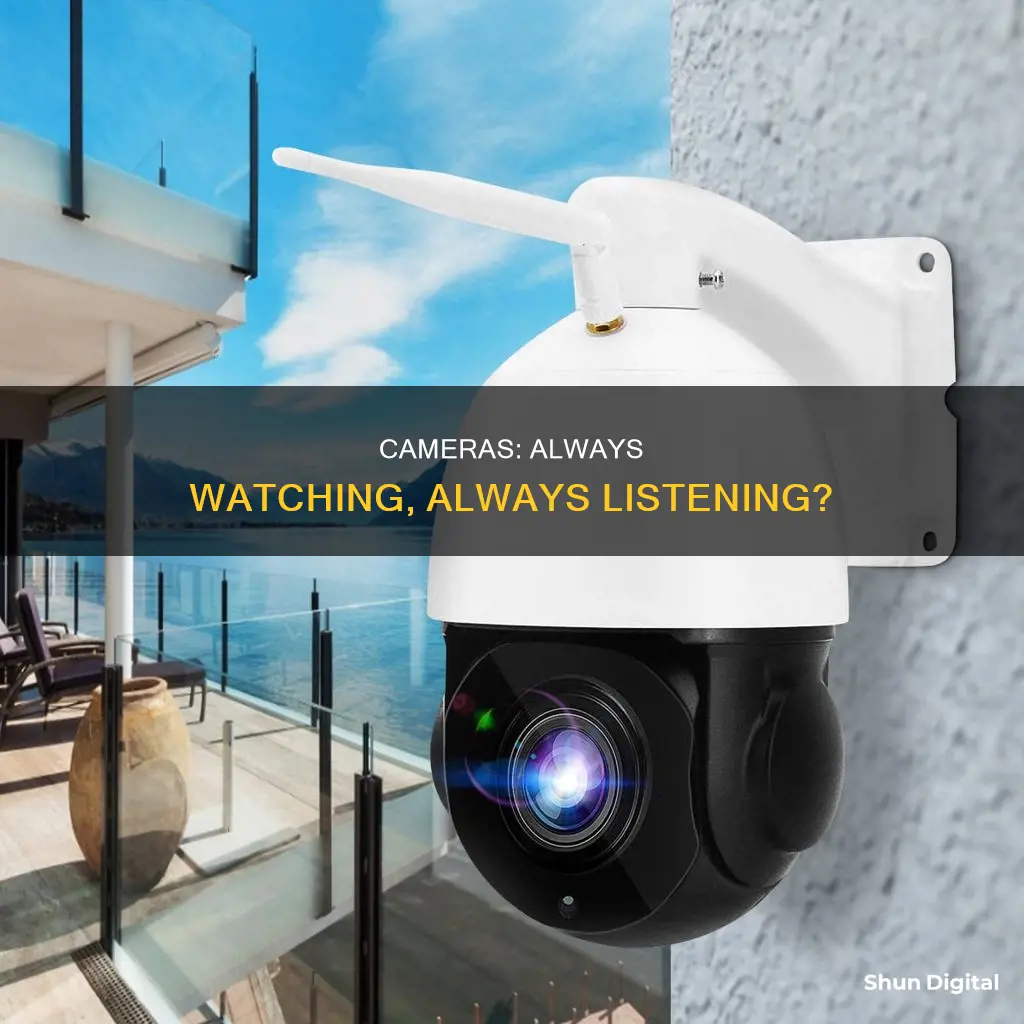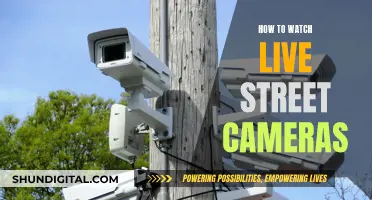
In today's world, the fear of constantly being watched by cameras is not uncommon. With the proliferation of surveillance cameras in public spaces and the increasing prevalence of camera-enabled devices, such as smartphones, it is understandable that some people may feel anxious about their privacy. This concern has been heightened by revelations of illegal mass surveillance programs and the misuse of personal data by tech companies. While it is important to be vigilant about potential privacy invasions, it is also crucial to maintain a sense of perspective and take steps to protect oneself from potential threats.
| Characteristics | Values |
|---|---|
| Surveillance cameras are everywhere | In big cities and at obvious places like Times Square or outside the White House, but also in smaller towns |
| Who's watching? | Organizations, individual people, cybercriminals, governments, tech-savvy stalkers, ex-spouses, family members |
| Why are they watching? | Financial gain, blackmail, data collection, abuse |
| How are they watching? | Phone cameras, webcams, security cameras, hidden cameras, spyware, remote-access trojan malware |
| How to know if you're being watched | Camera acting strangely, background app activity, excessive data usage, unfamiliar apps or files, suspicious emails or messages |
What You'll Learn

Phone cameras can be hacked
It is possible for your phone camera to be hacked, although it is still extremely unlikely. Hackers can gain access to your device's camera for various unauthorized purposes, known as camfecting. This can be done by installing spyware or remote-access trojan malware. While this is a possibility, many smartphones come with enhanced security measures that prevent camfecting.
- Check your data usage: Malicious apps often run in the background, using data to continue running tasks even when not in use. If you notice a sudden spike in data usage, it could be a sign of hacking.
- Investigate your camera's behavior: If your camera starts exhibiting strange behavior, such as third-party camera apps opening on their own or media appearing in your gallery that you don't remember capturing, it could indicate hacking.
- Review your camera permissions: Check the permissions granted to apps and revoke access for any illegitimate or unfamiliar apps.
- Monitor your video call performance: If your video calls are experiencing low quality or connection issues without any apparent reason, it could be a sign that someone is intercepting the call.
- Listen for strange sounds during calls: If you hear camera shutter sounds, static, clicking, or echoes during calls, it may indicate that someone is listening to or recording your call.
- Review your location permissions: Restrict location access to only essential apps, as hackers can use location data for malicious purposes.
- Monitor your camera light indicator: If the camera indicator light stays on even after exiting camera apps or turns on unexpectedly, it could be a sign of hacking.
- Look for newly added apps, photos, or video files: Malware can hide in media files, so be cautious if you notice any unfamiliar files or a sudden decrease in storage space.
- Assess your battery performance: Spyware apps can drain your battery quickly, so if your battery is losing power faster than usual, it could be a sign of hacking.
- Run a spyware scan: Use a reputable spyware scanning app to detect and remove any malicious software on your device.
- Check your device's temperature: If your phone is overheating without any apparent reason, it could be due to spyware running in the background.
To protect your phone camera from being hacked:
- Don't jailbreak your phone: Jailbreaking removes built-in security protections, making it easier for hackers to access your device.
- Avoid suspicious links and attachments: Be cautious when clicking links or opening attachments, as they can contain spyware.
- Strengthen your privacy settings: Limit app permissions, use strong passwords, and enable two-factor authentication to make it harder for hackers to access your device.
- Be cautious about third-party apps: Only download apps from official app stores or trusted websites to reduce the risk of installing spyware.
- Use mobile antivirus software: Install antivirus software to detect and remove malware, providing an additional layer of protection for your device.
Exploring Apple Watch: Accessing the Camera Functionality
You may want to see also

Surveillance cameras are everywhere
The advancement of technology has made it possible for cameras to be hidden in plain sight or disguised as everyday objects. This has led to a sense of unease and suspicion, with people wondering if their actions are being recorded and monitored. It is not uncommon for individuals to exhibit paranoid behaviours, such as checking for hidden cameras or feeling self-conscious even in the privacy of their own homes.
This phenomenon is not limited to physical spaces, as our digital lives are also under constant surveillance. Smartphones, social media apps, and other digital devices have become tools for data collection and remote monitoring. With the rise of cybercrime and the availability of spyware, it is easier than ever for cybercriminals and stalkers to gain access to our personal information and turn our own devices against us.
While the presence of surveillance cameras can have benefits, such as increased security and crime prevention, it also raises concerns about privacy and the potential for misuse. The line between safety and invasion of privacy is often blurred, leaving many individuals feeling anxious and exposed.
As technology continues to advance, the presence of surveillance cameras will only become more pervasive. It is important to be vigilant and informed about the potential risks and take steps to protect our privacy, both online and offline.
Monster High: Frights, Camera, Action! Streaming Options Revealed
You may want to see also

Spyware can control your phone camera
Spyware is a type of malware that can allow hackers to control your phone's camera and steal information. It can enable them to access your microphone, location, calendar, and contacts. This makes it possible for hackers to record your videos and calls.
There are various spyware products available on the market, and hackers sometimes use the features for blackmail or sell photos and videos to people on the black market. Some of the features include:
- Photo capture: Spyware can secretly take photos from a phone camera (either front and back). This is done remotely, and the victim is completely unaware. All the photos are automatically uploaded to a cloud server where they can be accessed from anywhere in the world.
- Video recording: Spyware such as FlexiSPY can take a video using the phone's camera. It's discreet—recording the video without the victim knowing anything. The video will then be uploaded directly to an online database.
- Remote camera monitoring: One of the most worrying features is the ability to watch someone 'live' through their phone camera. This could allow the hacker to broadcast the video live onto streaming sites or the dark web.
There are some tell-tale signs that your phone camera is being hacked:
- Your phone is behaving strangely, e.g., getting hot when not in use, the battery running out faster than usual, or high data usage.
- Your camera light indicator is on when you haven't opened any apps that use your camera.
- Your phone has newly added apps, photos, or video files that you don't recognise.
- Your video call performance is poor, with issues like glitches or pixelation.
- You hear strange sounds in calls, such as a camera shutter, static, clicking, or echoes.
To protect your phone camera from spying:
- Update your operating system and apps regularly.
- Use a case with a camera cover.
- Set a strong passcode.
- Enable Lockdown mode (for iPhones).
- Be cautious about third-party apps and only download from trusted sources.
- Use mobile antivirus software.
Apple Watch Ultra: Camera Expectations and Realities
You may want to see also

Cybercriminals can infect your device
Cybercriminals have numerous methods to infect your device. Here are some common ways they do it:
Phishing Attacks
Phishing is a social engineering attack that tricks people into revealing their personal information. Cybercriminals send victims messages such as emails or text messages with malicious attachments or links. When victims download the attachment or click on the link, they unknowingly install malware on their device.
Man-in-the-Middle (MITM) Attacks
MITM attacks intercept data transmitted between two parties. Cybercriminals rely on public WiFi networks to execute these attacks because the internet traffic on these networks is unencrypted and visible to them. They can then spread malware to connected devices by altering the intercepted data with malware.
Drive-by Downloads
Drive-by downloads occur when cybercriminals inject malicious code into a website, which automatically installs malware on a user's device when they visit the infected site. Users do not need to click on anything for the malware to be installed.
Malvertising
Cybercriminals inject malicious code into legitimate or fabricated ads displayed on high-traffic websites. When users click on the ad or download the software, their devices become infected with malware.
Spoofed Websites
Cybercriminals create spoofed websites that mimic legitimate sites to trick users into revealing their personal information or downloading software that contains malware.
Exploit Kits
Exploit kits are toolkits that cybercriminals use to exploit the security vulnerabilities of a system or device to deliver malware. They use malicious ads, compromised websites, or spoofed websites to make contact with users. Once a user clicks on a malicious link, they are redirected to the exploit kit's landing page, which looks for security vulnerabilities on their device and sends a payload to download malware.
Previously Installed Malware
Some cybercriminals use initial malware infections to gain backdoor access to a device and install more harmful types of malware without the victim's knowledge. They often use Trojan horses to gain unauthorized access and install additional malware. Infected devices can then spread malware to other devices connected to the same network.
Outdated Software
If your operating system or web browsers aren't up to date, hackers can break in by exploiting known security issues. Software updates address these vulnerabilities, so it's important to keep your software updated to prevent cyberattacks.
Weak Wi-Fi Network Security
Weak passwords, outdated firmware models, and missed software updates in your router's settings can leave your Wi-Fi network vulnerable to hacking. Gaining control of personal devices connected to a weakened network can be as simple as hacking into the Wi-Fi network itself.
Tech Support Scams
In tech support scams, hackers pose as reputable security companies and contact victims via email or pop-up messages, claiming that their computer has been compromised with a virus. They convince victims to call a tech support number, where they are tricked into granting remote access to their device, allowing the hacker to take control.
Sensitive Data on Old or Discarded Devices
If you don't properly wipe your old devices before getting rid of them, scammers can access sensitive data on your hard drives.
To protect yourself from cybercriminals, it's important to have antivirus software, use strong passwords, avoid clicking on suspicious links or attachments, only download software from reliable sources, and regularly update your software and operating system.
Laptop Camera: Am I Being Watched?
You may want to see also

Stalkerware is widely available
Stalkerware is monitoring software or spyware used for cyberstalking. It is often used by abusers, stalkers, and employers to spy on their spouses or intimate partners. It is also marketed as a tool for parental monitoring. Stalkerware has powerful surveillance functions, including keylogging, screenshotting, monitoring internet activity, recording location, and recording video and audio. It can run in stealth mode, with the user being unaware that they are being monitored. The application is often disguised as a system process or utility program and is not visible in the list of installed programs.
The rising popularity of stalkerware has led to an arms race between apps that help users protect their privacy and those designed to circumvent these safeguards. In 2014, 75% of domestic abuse shelters reported that they were working with individuals who had been tracked by their abusers via stalkerware. In 2020, a report by Kaspersky Lab found that the United States, Russia, and Brazil were the three countries most affected by stalkerware.
To protect yourself from stalkerware, you can install security apps that monitor your devices and scan for potentially unwanted or unauthorized apps. You should also be cautious about downloading third-party apps and only download from trusted sources like the App Store or Google Play. Be wary of suspicious links and attachments, as these can also lead to spyware.
Apple Watch Series 8: Camera Functionality Explored
You may want to see also
Frequently asked questions
Cameras are not constantly watching us, but it is possible for hackers, governments, and cybercriminals to access our cameras without our knowledge. It is also common to experience paranoia or anxiety about being watched, even when alone.
They can do this by installing spyware on your device, often through an outdated app, an infected link, or an unencrypted Wi-Fi connection.
There are several signs that may indicate that someone is accessing your camera, including strange camera activity, unfamiliar apps or files, excessive data usage, and background app activity.
To prevent unauthorized access, you can regularly update your software, remove unused apps, avoid clicking on suspicious links, use a reliable VPN, and be cautious about granting app permissions.
It is common to experience paranoia or anxiety about being watched, even when there are no cameras present. This can be related to mental health conditions such as bipolar disorder, schizophrenia, or OCD. If you are concerned, it may be helpful to consult a mental health professional.







